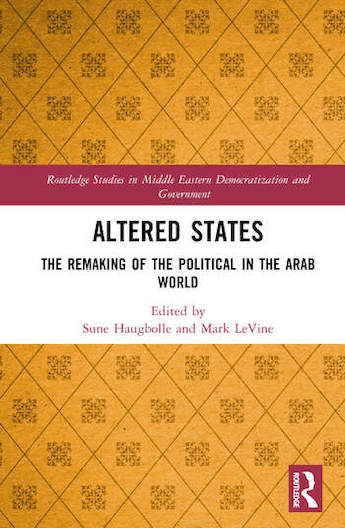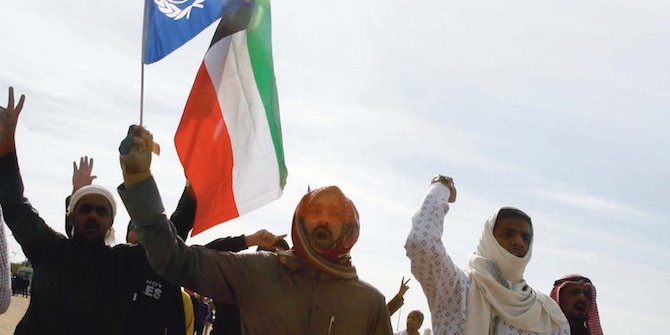by Marc Martorell Junyent
The Middle East and North Africa region features prominently – with a frequency that is probably only matched by Sub-Saharan Africa – in academic accounts of phenomena such as state failure, limited statehood, or hybrid political orders. But significant change is not only underway when the power of the state dramatically loosens. Instead, ‘states are always states-in-the-making,’ write Sune Haugbolle and Mark LeVine in the introductory chapter to their edited volume Altered States: The Remaking of the Political in the Arab World (p. 7). The editors’ understanding of stasis as the exception rather than the rule in the existence of states is decisively inspired by the work of Timothy Mitchell, a political theorist and historian at Columbia University.
In her praise of Mitchell, Jillian Schwedler notes that ‘“Limits of the State” and Mitchell’s other work have provided scholars with much analytical grist to chew on over the past 30 years’ (p. 271). Mitchell argued in his article ‘The Limits of the State: Beyond Statist Approaches and Their Critics’, published in 1991, that the state is in constant flux because it does not only constitute a ‘subjective belief,’ but is also ‘represented and reproduced in visible, everyday forms, such as the language of legal practice, the architecture of public buildings, the wearing of military uniforms, or the marking out and policing of frontiers.’
The cases presented in the book greatly vary in the degree of territorial control exercised by the central state. At the lower end of the spectrum, we find cases such as the Kurdish-led administration in Northern Syria, the opposition-held areas of Syria, and the territory controlled by Daesh. These three actors, which present radical differences, succeeded in – at least for a limited time – displacing the central state. This notwithstanding, they never lost the state as a frame of reference when establishing their rule.
In the case of Daesh, Michael Degerald explains that the terrorist group drew upon institutions and human capital that initially belonged to the Syrian and Iraqi states (p. 243). Degerald argues that, through its control of territory and establishment of laws, Daesh created what Timothy Mitchell calls the ‘effect of the state’ (p. 240). According to Mitchell, the ‘effect of the state’ is the perception of the state as a distant abstraction in contrast to the closeness and concreteness of society. Although they represented experiments of grassroots democracy, neither the Kurdish-led administration in Northern Syria nor the opposition-held areas of Syria managed to do away with this understanding of governing institutions as distinct from society, argues Andrea Glioti (p. 121).
Sophie Chamas examines how the state is perceived among community activists combating gentrification in Beirut’s Mar Mikhael neighbourhood. The activists feel that the state can impose its will if it wants to, for instance to grant business licenses in the area to those who enjoy political ties. However, the state is largely missing when it comes to meeting the daily needs of the neighbours (p. 56).
Still in Lebanon, the relationship with the state is quite different for the inhabitants of Wadi Khaled, a northern Lebanese village bordering Syria. The villagers had traditionally benefited from the limited interest of the Lebanese state in consolidating the Lebanese-Syrian border. Networks of legal and illegal trade provided relative prosperity to a village characterised by the lack of other economic opportunities. But, if the borders had long remained ‘extremely fluid and practically non-existent,’ notes Jamil Mouawad, the beginning of the Syrian Civil War in 2011 led to their sudden hardening (p. 179).
Part of the ‘states-in-the-making’ process consists of delimiting those who cannot make claims on the state while staying vigilant to prevent their self-organisation. This, Estella Carpi and Andrea Glioti write, is the case of migrant workers in the United Arab Emirates, where ‘societal group-making is monitored and even policed by the state-citizen Emirati polity’ (p. 39).
Although fluid by definition, state-making processes need some grounding, and this is often provided by national archives. Aware of this, the Palestine Liberation Organisation (PLO) Documentation Centre in Beirut became a main target for the Israeli army when it occupied Lebanon in 1982, explains Leyla Dakhli (p. 81). Because they document Palestinians’ historical continuity, national archives are fundamental for the Palestinian performance of stateness.
The diplomatic practices of the Palestinian Authority (PA) and Hamas also seek to perform the state. However, Michelle Pace notes that this focus on the performance of stateness at the international level by both political organisations has only led to sustaining ‘the “imagined state” at the expense of the Palestinians in the OPT’ [Occupied Palestinian Territories] (p. 230). While the PA and Hamas represent Palestine on the international stage, the expansion of Jewish settlements in the West Bank questions the viability of a future state as long as settlements continue to expand in Palestinian land. By June 2023, the Israeli government, the most right-wing in the country’s history, had already broken the annual record of approved settlement homes.
Similarly, the Palestinian town of Rawabi, master-planned by private real estate developers to accommodate up to 40,000 inhabitants, has discursively been positioned ‘as a city in service of the future Palestinian state,’ remarks Somdeep Sen (p. 147). Next to Rawabi, however, the Jewish settlement of Ateret remains ever-present. In June 2023, a group of settlers who had previously attacked the Palestinian village of Umm Safa, only two kilometres away from Rawabi, sought refuge in the Ateret settlement and violently engaged with the Israeli police when it arrived at the place. Itamar Ben-Gvir, the far-right National Security Minister, defended the settlers after this dispute. Considering that members of the Israeli government refuse to condemn the settlers’ attacks that took place in the vicinity of Rawabi, it is difficult to envision the future Palestinian state this master-planned town is supposed to serve.
The case of the Egyptian state, which has been a main focus of research for Mitchell, is discussed in two different chapters. Angela Joya does so from a political economy perspective, arguing that contrary to what liberal scholars had expected, the arrival of neoliberalism to Egypt in the 1990s did not do away with the authoritarianism of the state. Instead, it led to a refashioned neoliberal authoritarianism that showed a particular concern for the enforcement of private property rights and market discipline (p. 113).
Meanwhile, in his examination of the interaction between secular artists and intellectuals and the modern Egyptian state, Ted Swedenburg argues that ‘any notion of artistic “autonomy” … is rather illusory’ (p. 208). The authoritarian Egyptian state wants to remain in control of anything remotely ‘political’, and this implies constraining artistic freedom. This repression of art is less surprising if we consider the overall situation of human rights in Egypt. In 2022, rights groups estimated that Egypt had 60,000 political prisoners, or half of the total jail population.
Altered States is a very diverse volume that, drawing on Mitchell’s critical approach towards traditional state theory, discusses the relationship of a broad range of actors with the state. The different authors show that the debate on the state in the Middle East is much broader than the false dichotomy between state failure and a Westphalian state exercising uncontested sovereignty would suggest.
[To read more on this and everything Middle East, the LSE Middle East Centre Library is now open for browsing and borrowing for LSE students and staff. For more information, please visit the MEC Library page.]







